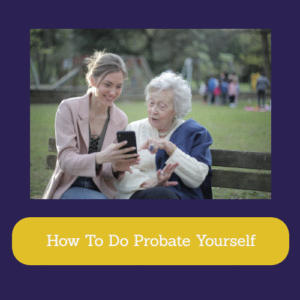 What does a probate lawyer do?
What does a probate lawyer do?
They are a common sight among local high street law firms. But what exactly does a probate lawyer do?
In short, a solicitor who specialises in probate should handle all of the complex financial and legal requirements of the probate process for you.
This process can be lengthy. It can involve important tax and money matters. For many, it can also be too much to handle on top of the grief at the passing of a loved one.
Let us know a little about your situation on 0845 1391399 or by completing a Free Online Enquiry today and we can connect you with a legal specialist who can give you the kind of advice you’re looking for.
Here is everything you need to know about probate solicitors, what they do, and whether it is worth getting one in your particular case:
What Is Probate?
Probate is a legal right that gives a person – someone who has been named as the executor in the will – permission to administer the estate of a deceased person.
The administration of an estate includes things like paying off the deceased’s debts, paying any Inheritance Tax they owe, and distributing the legacies (inheritance) to people named in the will.
The probate process confirms that the will is valid and that the person (or people) named as the executor are correct and ready to begin their work.
If the courts agree that this is the case, they will dispatch a legal document called a Grant of Probate. Probate is then said to have been “granted”.
If there is no will, there won’t be a named executor. In this case, certain close relatives of the deceased can apply for a similar document called a Grant of Letters of Administration.
What Does A Probate Solicitor Do?
A probate lawyer’s job is to help you with all of the challenging and sometimes stressful administrative tasks that are so important to get right during probate.
There is a huge range of tasks that need to be completed as part of the process. These include but are not limited to:
- Applying for the Grant of Probate
- Valuing all of the estate’s assets and liabilities
- Filling in Inheritance Tax forms and ensuring this is paid correctly
- Working out and paying any Capital Gains Tax that accrues during the probate period
- Setting up a trust or trusts if the will instructs them to do so
Is It Worth Getting A Probate Lawyer?
You aren’t required by law to have a solicitor handle the process for you. However, there are several reasons why you might consider getting a probate lawyer:
1) The Etate Or Will Is Complicated
If the estate in question includes multiple properties, lots of investments, several bank accounts, or – most confusingly – overseas assets, you’re going to be well served by a good probate lawyer.
Trusts confuse matters too. If the will instructs you to set up a trust or administer a trust that was set up while the person whose will it is was still with us, using an expert will again be well worth it.
2) You’re Worried About Making Mistakes With Tax Or Law
As part of the probate process, the deceased’s estate needs to be registered with HMRC and several different taxes have to be paid. These include:
- Inheritance Tax
- Capital Gains Tax
- Income Tax
Making errors when valuing the estate or filling in the required information can lead to delays and higher tax bills. Not to mention accusations that you’ve failed to be compliant deliberately.
In general, there are many aspects of administering an estate and even applying for the Grant of Probate document that are complex or challenging if you aren’t familiar with the laws involved.
For instance, if you don’t pay the right Inheritance Tax or don’t allow creditors enough time to claim on the estate, you may end up having to pay the costs yourself.
Having a probate specialist handle it for you ensures everything is done correctly in line with the latest legislation. “I didn’t understand how it worked” isn’t usually accepted by HMRC as an excuse.
3) You Don’t Have The Time Or Emotional Headspace
As well as concerns regarding technical difficulty or costly errors, many people choose to employ a probate solicitor simply because they don’t want additional worry at a difficult time.
Using a probate specialist allows you to concentrate on your and your family’s needs at a time when time pressure and the emotional impact of a loss may be at their height.
Probate Solicitor Near Me
Let us know a little about your situation on 0845 1391399 or by completing a Free Online Enquiry today and we can connect you with a legal specialist who can give you the kind of advice you’re looking for.

 The probate process can be a long and involved one that many people want to avoid. So, how much money can you have in the bank before probate in the UK?
The probate process can be a long and involved one that many people want to avoid. So, how much money can you have in the bank before probate in the UK? Britains have been hit with £6 million penalties for late filing of death taxes – UK Inheritance Tax Late Penalties Revealed!
Britains have been hit with £6 million penalties for late filing of death taxes – UK Inheritance Tax Late Penalties Revealed! Can you do probate yourself? Yes, you can do probate yourself. There’s no legal requirement to hire a probate solicitor or any legal professional.
Can you do probate yourself? Yes, you can do probate yourself. There’s no legal requirement to hire a probate solicitor or any legal professional. Amidst the grief of the passing of a loved one, the complex legal process of probate is often the last thing you want to deal with. Yet it can minimise the costs associated with a death.
Amidst the grief of the passing of a loved one, the complex legal process of probate is often the last thing you want to deal with. Yet it can minimise the costs associated with a death.